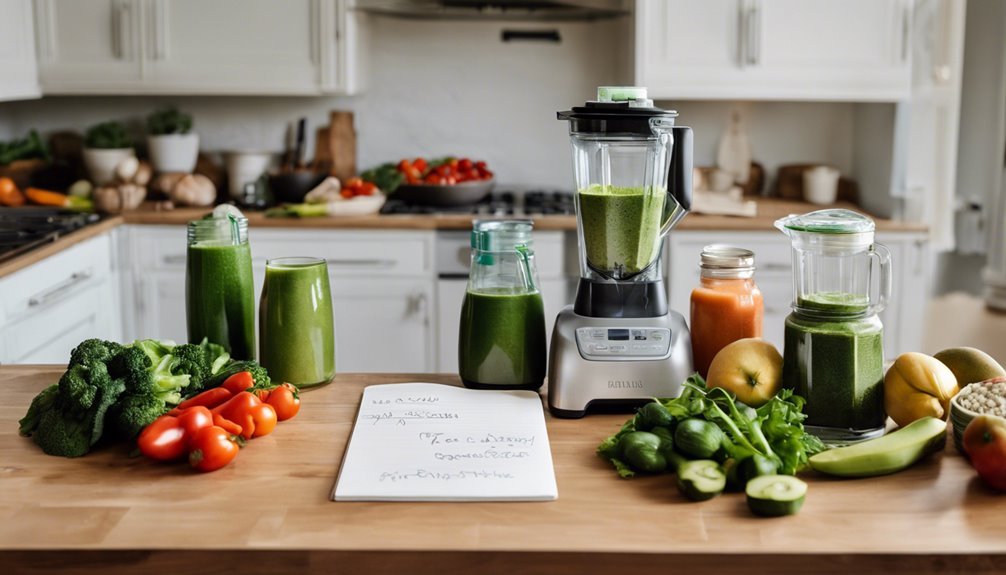Time-Saving Meal Prep for Breastfeeding Moms
As a breastfeeding mom, you're juggling the demands of nurturing your newborn and maintaining your own health, so mastering the art of time-saving meal prep is crucial. By planning your meals and embracing tools like slow cookers, you can ensure you're eating nutrient-rich foods without spending hours in the kitchen. Imagine chopping vegetables for the week or blending up a nutritious smoothie in mere minutes. Curious about how to streamline your meal prep process even further and keep your energy levels high? Stay tuned as we explore essential strategies that can transform your meal preparation into an effortless part of your routine.
Key Takeaways
- Utilize a slow cooker for low-supervision cooking, allowing meal preparation while tending to the baby.
- Batch cook and store meals in labeled, high-quality containers for quick access and organization.
- Incorporate a high-speed blender for quick, nutrient-rich smoothies, suitable for meals or snacks.
- Plan and prep meals weekly, using nap times for focused cooking sessions.
- Invest in a rice cooker with a steamer to simultaneously cook grains and steam vegetables, saving time and effort.
Understanding Nutritional Needs
During the breastfeeding period, it's crucial to understand your unique nutritional needs to ensure both you and your baby thrive. Your body requires additional calories to produce milk, so understanding the increase in your caloric intake is essential. Typically, you'll need about 400 to 500 extra calories per day compared to your pre-pregnancy intake.
These additional calories should come from nutrient-dense foods to support your energy levels and overall health.
Equally important is staying hydrated. Breastfeeding can dehydrate you because a significant amount of fluid is diverted to milk production. It's recommended to increase your fluid intake by drinking at least 8 to 12 cups of water a day.
This doesn't just mean water—soups, milk, and caffeine-free teas also count. However, water is often the best choice for maintaining optimal hydration without adding extra calories or sugar.
Planning Your Meal Strategy
With your nutritional needs in mind, it's time to strategize your meal prep effectively. Meal planning is a key component in ensuring you meet your dietary needs while breastfeeding. By planning ahead, you can ensure that your meals are not only nutritious but also align with your dietary preferences. Here are a few steps to get you started:
- Identify Your Preferences: List down your favorite meals that fit within your dietary restrictions. This makes the meal prep process enjoyable and personalized.
- Batch Cooking: Prepare and cook meals in batches. This saves time and ensures you have several meals ready throughout the week.
- Diversify Your Nutrition: Include a variety of foods to ensure you get a range of nutrients. Each meal should have a good balance of proteins, fats, and carbohydrates.
Here's a simple table to help organize your weekly meal planning:
| Day | Meal Type | Ingredients |
|---|---|---|
| Monday | Breakfast | Oatmeal, berries, flaxseeds |
| Wednesday | Lunch | Quinoa salad, chickpeas, vegetables |
| Friday | Dinner | Grilled salmon, sweet potato, broccoli |
| Sunday | Snack | Greek yogurt, honey, nuts |
This table serves as a template to modify according to your needs and available ingredients.
Essential Time-Saving Tools
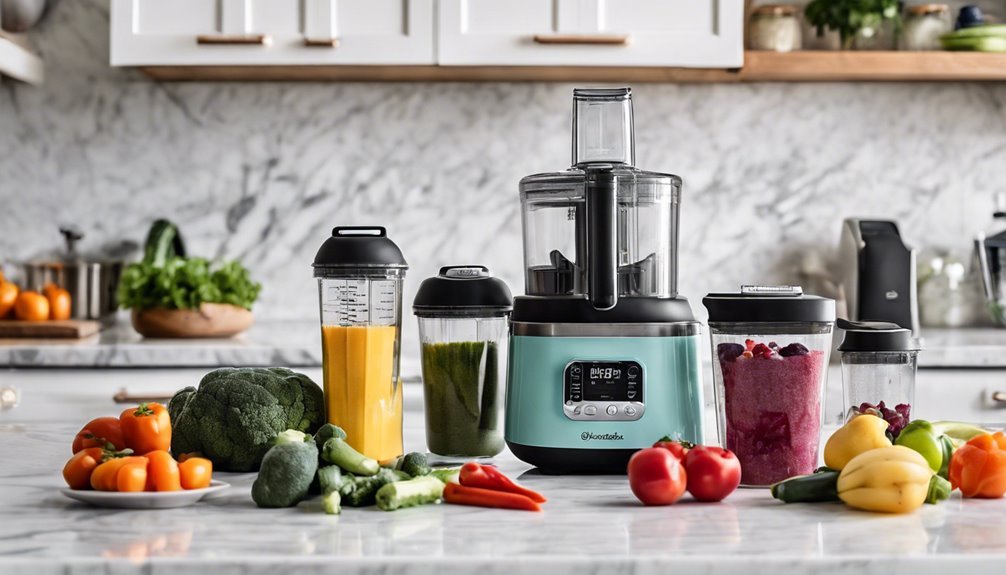
Having established your meal planning strategy, it's equally important to equip yourself with the right tools to save time in the kitchen.
Efficient meal prep is crucial, particularly when you're juggling the demands of breastfeeding and possibly caring for other family members. Here are five essential kitchen gadgets and meal prep containers that can streamline your cooking process:
- High-Speed Blender: Perfect for making smoothies, soups, and purees rich in nutrients that support lactation.
- Slow Cooker: Set it in the morning and have a nutritious meal ready by dinner, without constant supervision.
- Quality Chef's Knife: A sharp, reliable knife reduces prep time significantly, making chopping and slicing quicker and safer.
- Set of Glass Meal Prep Containers: These are ideal for storing pre-chopped veggies, cooked grains, or complete meals, keeping food fresh and ready to reheat.
- Rice Cooker with Steamer Basket: Cook grains in the bottom while simultaneously steaming vegetables or fish, maximizing your meal prep efficiency.
Investing in these tools not only saves you time but also helps ensure that you're eating well, which is vital for your health and your baby's.
Grocery Shopping Made Simple
To streamline your grocery shopping as a breastfeeding mom, start by creating a detailed list based on your meal prep plan. This list should prioritize pantry staples and include seasonal produce to ensure you're getting the freshest, most nutritious options.
Remember to add items for bulk buying, which can save time and money in the long run.
Consider using online shopping to manage your time more effectively. Many stores offer services that let you select your groceries online and either pick them up at a quick checkout option or have them delivered to your home, ensuring you adhere to food safety standards without sacrificing your schedule.
Explore local markets for budget-friendly deals. These markets often provide the freshest produce and give you the chance to support local businesses. Plus, you can find unique items that aren't always available in bigger stores.
Think about subscribing to meal subscriptions if your budget allows. These can be a great way to receive nutrient-dense meals without the hassle of planning and shopping, allowing you more precious time with your baby.
Always keep food safety in mind; ensure that all perishable items are stored promptly and correctly to avoid any health risks.
Batch Cooking Basics
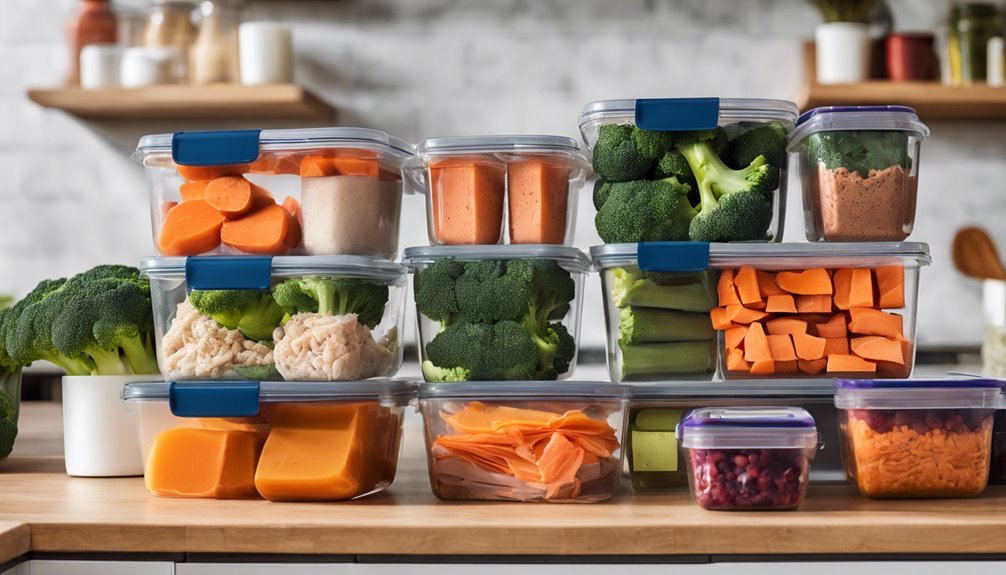
Why not simplify your weekly meal prep with batch cooking? As a breastfeeding mom, you're constantly juggling demands. Batch cooking is a reliable way to ensure you have nutritious meals ready, saving you precious time and energy.
By dedicating a few hours to cooking large quantities of food at once, you can prepare multiple dishes that cater to your dietary needs. This method isn't only efficient but also helps maintain a healthy diet, crucial for both you and your baby.
Here's how you can get started with batch cooking:
- Plan Ahead: Schedule cooking sessions during times when you're least likely to be interrupted. Early mornings or nap times are ideal.
- Efficient Techniques: Use cooking methods like roasting and slow cooking. These techniques can handle large volumes of food with minimal supervision.
- Versatile Ingredients: Choose ingredients that can be used in multiple recipes throughout the week.
- Proper Storage: Invest in good quality containers that keep food fresh and are easy to stack in your freezer or refrigerator.
- Label Everything: Clearly label containers with the date and contents to avoid any guesswork later.
Batch cooking isn't just a time-saver; it's a strategic approach to ensure that you're nourished and ready to care for your baby.
Quick and Healthy Recipes
After mastering batch cooking, you'll want to incorporate quick and healthy recipes that align with your nutritional needs as a breastfeeding mom. Quick breakfast ideas and nutritious lunch options can be both time-efficient and beneficial for your health and energy levels.
For breakfast, consider smoothies packed with fruits, vegetables, and a protein source like Greek yogurt or a scoop of protein powder. This combination ensures you're getting essential vitamins and minerals, plus protein to keep you full and energized.
Oatmeal bowls are another fantastic choice. Top them with nuts, seeds, and perhaps a bit of honey for a touch of sweetness. Both options are quick to prepare, ensuring you're not spending too much time in the kitchen.
When it's time for lunch, focus on salads that incorporate lean proteins and a variety of vegetables. Chicken breast, canned tuna, or chickpeas can serve as your protein base.
Add a rainbow of vegetables—spinach, tomatoes, carrots, and bell peppers—for a nutrient-packed meal. Dressings made from olive oil and vinegar or citrus juices can add flavor without excessive calories.
These meals not only meet your dietary needs but also ensure you're nourished and ready to take on the day while caring for your baby.
Utilizing Leftovers Creatively
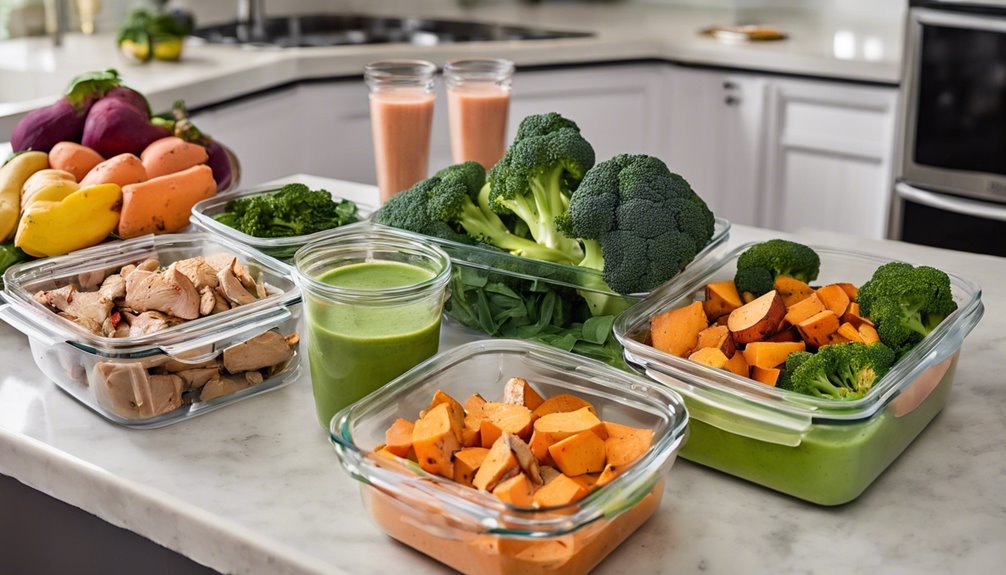
While mastering quick and healthy recipes is beneficial, don't overlook the value of creatively using leftovers. As a breastfeeding mom, you're not just feeding yourself; you're nourishing your baby too.
Creative repurposing of leftovers not only saves time but also ensures you're packing in essential nutrients without the extra effort every mealtime.
Leftover transformations can be both fun and nutritious. Here's how you can turn last night's dinner into today's nutrient-rich meal:
- Reinvent Proteins: Shred leftover chicken or beef to add to salads, soups, or wraps for a protein boost.
- Veggie Magic: Blend cooked vegetables into smoothies or chop them for omelets, maximizing your intake of vitamins and minerals.
- Grain Rebirth: Use leftover rice or quinoa as a base for a new dish by adding some fresh herbs, nuts, and a light dressing.
- Soup Stock: Boil bones or vegetable scraps to create a rich, homemade stock that's perfect for soup bases and more.
- Combo Creations: Combine various leftovers to create a new dish, such as mixing grains, proteins, and veggies for a hearty casserole.
Embrace these strategies to make the most out of your meals while ensuring you and your baby receive the best nutrition possible.
Freezing and Storage Tips
Effective freezing and storage techniques are crucial for breastfeeding moms who need to ensure their meals remain nutritious and safe for consumption over time. When you're storing meals, always opt for high-quality storage containers that are BPA-free to avoid chemical leaching.
These containers should also be airtight to maintain freshness and prevent freezer burn, which can degrade your meal's quality and nutrient content.
For your freezer meal ideas, consider dishes that freeze well without losing texture or flavor, such as stews, casseroles, and marinated meats. Label each container with the date of freezing and the type of meal. This simple step helps you rotate your stock and use meals while they're at their best, typically within three to six months.
When reheating, ensure you thaw your meals in the refrigerator overnight rather than at room temperature to reduce the risk of bacterial growth. Always reheat to the appropriate temperature to ensure food safety.
Organizing Your Kitchen Space
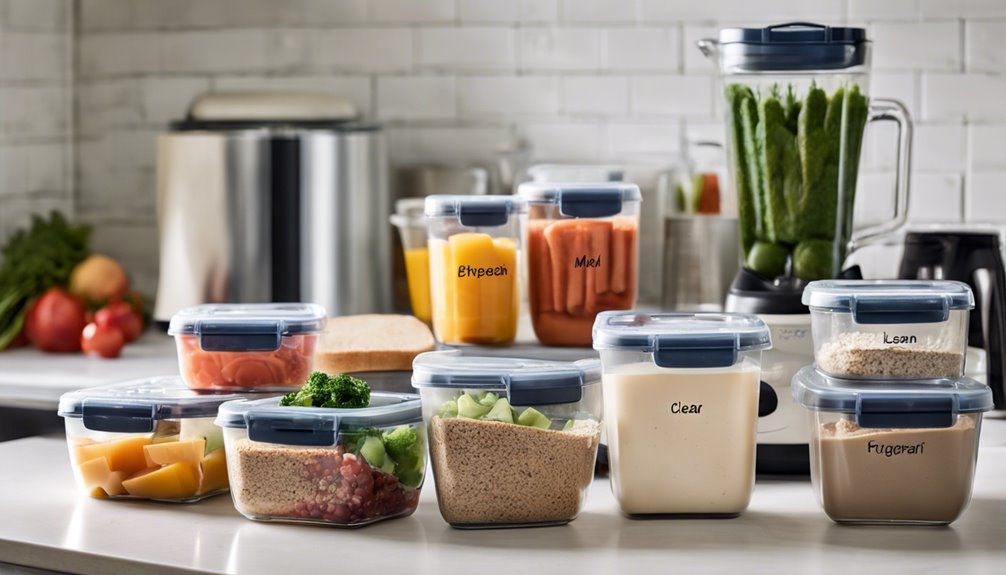
Organizing your kitchen space can significantly streamline your meal prep process, especially for breastfeeding moms who need efficiency and simplicity.
A well-planned kitchen layout and thoughtful pantry organization are crucial. You're not just preparing meals; you're ensuring that your nutritional needs are met quickly and effectively, which is vital during this demanding time.
Here are some practical tips to optimize your kitchen:
- Rearrange for Accessibility: Place frequently used items like rice, pasta, and healthy snacks at eye level in your pantry.
- Group Similar Items: Keep all your baking supplies, spices, or canned goods together. This saves time and reduces stress when you're searching for ingredients.
- Invest in Clear Containers: Transparent bins and canisters allow you to see what you have and what you're running low on, preventing unnecessary purchases or wastage.
- Label Everything: Use labels on shelves and containers to make it easier to find what you need quickly. This is especially handy when you're tired or distracted.
- Dedicate a Prep Station: Set aside a specific area in your kitchen for meal preparation. Equip it with cutting boards, knives, and mixing bowls to keep everything within reach.
Prepping Snacks and Smoothies
To ensure you're getting the nutrition and energy you need as a breastfeeding mom, prepping snacks and smoothies can be a game-changer. Focusing on nutrient-dense foods will not only keep you fueled but also benefit your baby's health.
Here are some snack ideas and smoothie combinations that are both delicious and nutritious:
| Snack Ideas | Smoothie Combinations |
|---|---|
| Almond butter on whole grain toast | Spinach, blueberry, and flaxseed |
| Greek yogurt with honey and walnuts | Banana, peanut butter, and oat milk |
| Sliced apples with cheddar cheese | Avocado, kale, and coconut water |
| Hummus with carrot and cucumber sticks | Mango, Greek yogurt, and almond milk |
These snacks and smoothies are quick to prepare and perfect for those times when you're too busy to cook. They're packed with essential nutrients like protein, fiber, and healthy fats, which are crucial for your recovery and ongoing health as a new mom.
Time Management Techniques
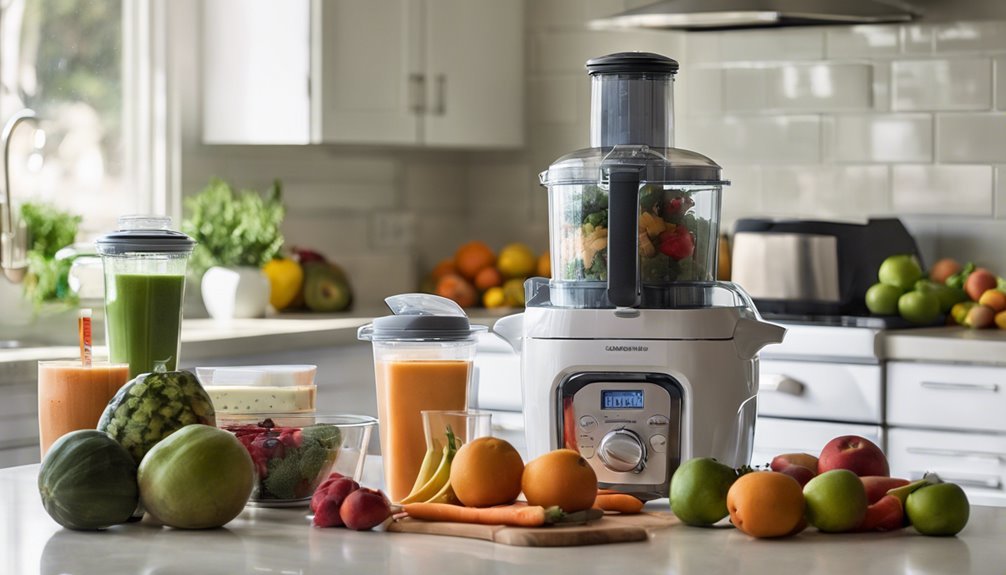
Balancing the demands of a newborn with daily tasks requires smart time management strategies, especially for breastfeeding moms.
Effective time allocation and priority setting are key to ensuring you and your baby thrive during this precious yet demanding time.
Here are some practical techniques to help you manage your time efficiently:
- Plan Meals Weekly: Dedicate time each week to plan and prep meals. This reduces daily stress and improves your nutrition intake.
- Use Baby's Naptime Wisely: When your baby naps, resist the urge to do every household chore. Instead, prioritize tasks that align with your energy levels and nutritional needs.
- Batch Cooking: Prepare and cook meals in large batches. Freeze portions for later use to ease your daily cooking responsibilities.
- Delegate Tasks: Don't hesitate to ask for help from family or friends. Delegate tasks that others can easily take over, allowing you to focus more on your baby and personal health.
- Set Realistic Goals: Keep your daily goals achievable. Overcommitting can lead to frustration and exhaustion, which isn't beneficial for you or your baby.
Encouraging Self-Care and Nutrition
Amid the hustle of motherhood, it's essential to prioritize your well-being and nutritional health, ensuring you're nourished and energized to care for your baby. Self-care routines and nutrition awareness aren't just buzzwords—they're fundamental pillars for thriving during this transformative time.
Focusing on nutrition isn't merely about eating well—it's about feeling your best. As a breastfeeding mom, your body requires more calories and nutrients. It's crucial to include a variety of proteins, whole grains, and fresh vegetables in your meals. Incorporating foods rich in iron, calcium, and omega-3 fatty acids can significantly enhance your energy levels and overall health.
Don't forget hydration. Drinking plenty of water is pivotal, particularly when breastfeeding, as it aids in milk production and helps maintain your energy.
Furthermore, self-care extends beyond diet. It encompasses adequate sleep, physical activity, and mental health breaks. Whether it's a short walk, meditation, or reading a book, taking time for yourself is vital.
You can't pour from an empty cup, so filling yours should be a top priority.
Frequently Asked Questions
Can My Diet Affect My Baby's Sleep Patterns?
Yes, your diet can influence your baby's sleep patterns through changes in milk composition.
Foods you consume might affect the hormones and nutrients in your breast milk, potentially impacting how well your baby sleeps.
Certain substances, like caffeine, can disrupt your baby's sleep.
It's important to maintain a balanced diet and observe if certain foods cause sleep disturbances, helping to strengthen healthier sleep associations for your little one.
Should I Avoid Spicy Foods While Breastfeeding?
You might worry that spicy foods could upset your baby, but there's no need to avoid them unless you notice discomfort in your infant after nursing.
Most babies tolerate a variety of flavors in breast milk, which can actually enhance breastfeeding benefits by exposing them to different tastes.
Just monitor your baby's reaction and adjust your diet accordingly. Eating a well-rounded diet helps ensure you both receive essential nutrients, making your breastfeeding journey smoother.
How Much Water Should I Drink When Breastfeeding?
When breastfeeding, it's crucial to stay hydrated. Aim to drink at least 8-10 glasses of water daily.
Your water intake supports milk production and maintains your overall health. Don't wait until you're thirsty; sipping water throughout the day is a practical hydration tip.
If your urine is dark yellow, it's a sign to increase your fluid intake. Remember, adequate hydration is key for both you and your baby's well-being.
Are There Foods That Increase Milk Supply?
Imagine your body as a garden where certain foods water the plants, boosting their growth.
Foods like oatmeal and fenugreek seeds are like rain showers, nourishing your garden and potentially increasing your milk supply.
Oatmeal benefits you by providing essential nutrients, while fenugreek seeds are often praised for enhancing milk production.
Incorporating these into your diet can help you serve your baby's needs more effectively, ensuring a well-nourished start in life.
Is It Safe to Consume Caffeine While Breastfeeding?
Yes, you can consume caffeine while breastfeeding, but it's crucial to do so in moderation.
Caffeine effects can vary, but generally, small amounts (about 1-2 cups of coffee daily) aren't likely to harm your baby. You might notice benefits from staying alert and energized.
However, more significant amounts may lead to irritability or sleep disturbances in your infant. Always monitor your baby's reaction and consult your healthcare provider for personalized advice.
Conclusion
Now, you're equipped to tackle meal prep like a pro, saving time like a chef with a well-oiled machine. By using these strategies, you'll not only nourish your body but also maximize those precious moments with your little one. Remember, every batch cooked and every snack prepped is a step towards sustaining your energy and health. Embrace these time-saving techniques, and watch your meal prep become as smooth and efficient as a streamlining river, enhancing your breastfeeding journey.

